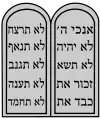| Part of a series on |
| Judaism |
|---|
   |
The Seven-Faceted Blessing (Hebrew: ברכה אחת מעין שבע, berakha aḥat me‘en sheva‘) is a blessing recited in the Jewish liturgy of Friday evenings. It is similar to the out-loud repetition of the Amidah, which is recited in each daytime prayer. On typical evenings, the Amidah is recited only silently, with no out-loud repetition, but on Friday nights, in honor of the Sabbath, the Seven-Faceted Blessing is recited as an abbreviated repetition.[1]
As the normal Sabbath Amidah prayer contains seven blessings, the Seven-Faceted Blessing contains a condensed version of the themes in these seven blessings. The Seven-Faceted Blessing begins with the beginning of the text of the first blessing of the Amidah; continues with the paragraph “Magen Avot” (מגן אבות), which summarizes the themes of all seven blessings of the Sabbath Amidah; and concludes with a paragraph about the sanctity of the sabbath, and a concluding sentence: "Blessed are You, O Lord, who sanctifies the Sabbath."
The Seven-Faceted Blessing is recited every Friday evening of the year, even if it coincides with a festival or Yom Kippur. This is in contrast to most of the Sabbath liturgy, which is jettisoned if a particular Sabbath falls on a festival or on Yom Kippur.
In the Eastern Ashkenazic rite and in most Sephardic communities, this blessing is omitted on the first night of Passover, because that is considered a "time of protection"; in the Western Ashkenazic rite as well as many Chasidic communities,[2] it is recited as normal.[3]
The text of the Seven-Faceted Blessing (in accordance with the Ashkenazic version—other traditions have very similar versions) can be found in Seder Avodat Yisra’el on pp. 190–191.[4] The text used in most Western Sephardic Communities can be found in "Seder Tefilah" of Mantua.[5]
In medieval Europe, it was fairly common for congregations to insert special poems, called Magen Avot piyyutim, into the middle of this blessing;[6] while this is less common today, some Western Ashkenazic communities (such as Khal Adath Jeshurun) recite such a piyyut when the second night of Shavuot falls on the Sabbath.[7]
References
- ↑ Ismar Elbogen, Der jüdische Gottesdienst in seiner geschichtlichen Entwicklung, Berlin, 1907.
- ↑ Gavriel Zinner, Nitei Gavriel, Pesach 2, page 305, note 12 says that it is recited in Viznitz, Rafshitz, Kiydeno, Spinka and Skver.
- ↑ See Jonah Frankel, Passover Machzor, page 9 of the introduction.
- ↑ Seligmann, Bär, ed. (1868). Seder Avodat Yisra'el (סדר עבודת ישראל). Rödelheim.
{{cite book}}:|website=ignored (help)CS1 maint: location missing publisher (link) - ↑ Sidur Tefillah KeMinhag Kahal Kadosh Sefaradim (סדור תפלה כמנהג קהל קדוש ספרדים), (Mantua, 1868), p. 131
- ↑ See Ezra Fleischer, "Poetic Embellishments of the Prayer ‘Magen Avot’ " (Hebrew: עיטורי פיוט לתפילת מגן אבות); Tarbiẕ 45 (1976-7), issue 1-2), pp. 89-107.
- ↑ See Wolf Heidenheim, ed., Maḥzor for the Festival of Shavu‘ot (Hebrew: מחזור לחג השבועות), Rödelheim 1831; folio 77a; available online at: http://hebrewbooks.org/pdfpager.aspx?req=43202&st=&pgnum=218.